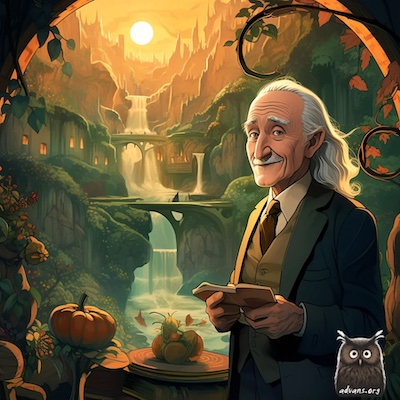J.R.R. Tolkien, an English author and scholar, is regarded as one of the greatest literary minds of the 20th century. Best known for his high fantasy works, particularly “The Hobbit” and “The Lord of the Rings” trilogy, Tolkien’s captivating storytelling and imaginative world-building have left an indelible mark on literature and popular culture. In this article, we will delve into the life, works, and enduring legacy of this literary genius.
Born on January 3, 1892, in Bloemfontein, South Africa, John Ronald Reuel Tolkien was destined to become a luminary in the realm of fantasy literature. At a young age, he displayed an affinity for languages and mythology, which would greatly influence his future works. After his family moved to England, Tolkien excelled in his studies and eventually pursued a degree in Classics at Oxford University, where he developed a deep appreciation for philology and Old English.
Tolkien’s love for language and mythology, coupled with his experiences as a soldier during World War I, played a pivotal role in the creation of his legendary world, Middle-earth. Inspired by his passion for constructing fictional languages, Tolkien crafted a rich tapestry of cultures, histories, and characters that would populate his fictional universe. From the humble hobbits to the mighty elves, the intricate landscapes of Middle-earth came alive under Tolkien’s masterful pen.
Tolkien’s first foray into Middle-earth came with the publication of “The Hobbit” in 1937. This enchanting tale of Bilbo Baggins, a reluctant hero thrust into a grand adventure, captured the hearts of readers young and old. Filled with whimsical creatures, perilous quests, and profound themes, “The Hobbit” laid the foundation for the epic saga that would follow.
Tolkien’s magnum opus, “The Lord of the Rings,” emerged as a monumental work that defied genre boundaries. Published as three volumes from 1954 to 1955, the epic tale chronicled the quest to destroy the One Ring and the struggles faced by a fellowship of diverse characters. With its intricate world-building, rich mythology, and profound themes of friendship, sacrifice, and the battle between good and evil, “The Lord of the Rings” captivated readers worldwide and solidified Tolkien’s status as a literary titan.
Tolkien’s contributions to literature extend far beyond his popular works. His meticulous world-building and attention to detail set new standards for fantasy writing, inspiring countless authors to create their own imaginary realms. Moreover, his profound exploration of themes such as heroism, the power of myth, and the preservation of nature resonated deeply with readers, fostering a lasting impact on the fantasy genre and beyond.
Tolkien’s works have transcended the realm of literature, captivating audiences through various adaptations. From Peter Jackson’s highly acclaimed film adaptations of “The Lord of the Rings” and “The Hobbit” to video games, artwork, and even music inspired by Middle-earth, Tolkien’s richly realised world continues to thrive and enchant new generations.
Tolkien’s indomitable imagination, masterful storytelling, and profound themes have made him an enduring literary icon. Through his captivating tales set in the enchanting realm of Middle-earth, Tolkien has taken readers on extraordinary journeys, inviting them to explore the depths of courage, friendship, and the power of imagination. His legacy as the father of modern fantasy literature is firmly established, ensuring that his works will continue to inspire and transport readers to magical realms for generations to come.

